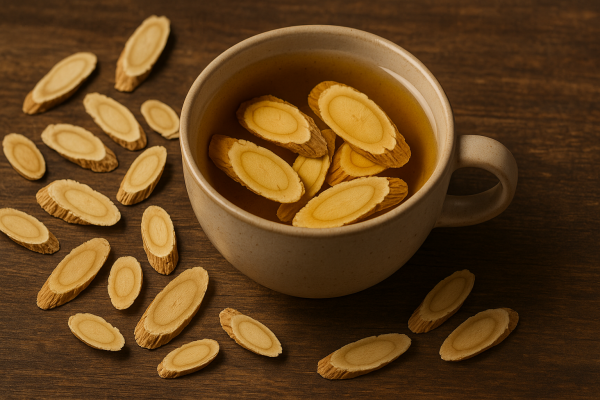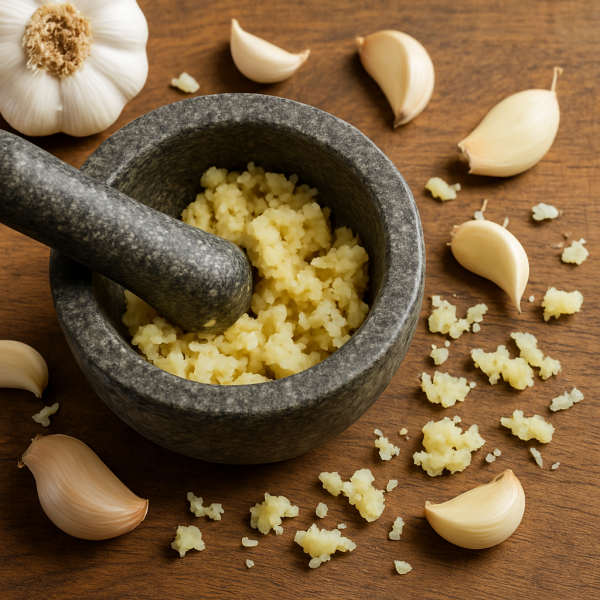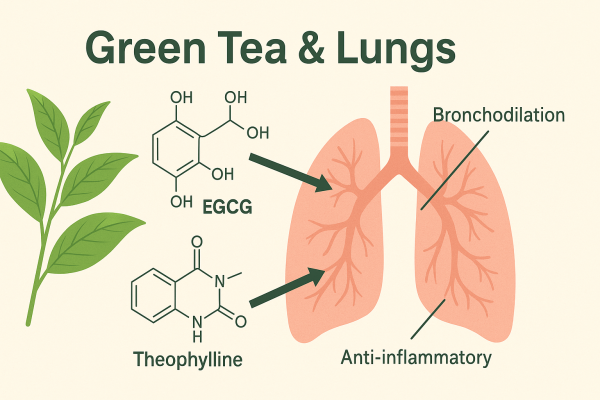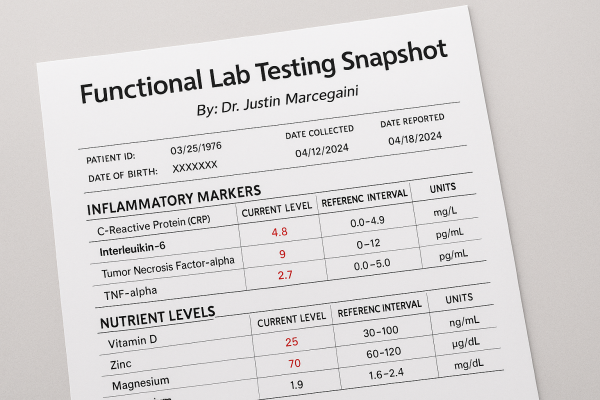

Our lungs work tirelessly to bring oxygen into the body and expel toxins, yet factors like diet, genetics, environmental pollutants, and stress can compromise respiratory function. Incorporating specific botanicals into your routine can provide natural support for sore throats, dry or productive coughs, mucus balance, and overall immune resilience. Below, discover the top lung-supportive herbs, plus insights on how functional medicine lab testing can guide and personalize your respiratory care.

Astragalus (Astragalus membranaceous) is prized in Traditional Chinese Medicine for its immune-modulating effects. It stimulates key white blood cells, helping those prone to recurrent colds or chronic respiratory issues build resilience. During the cold season, add sliced astragalus root to bone broths or steep it into a warming tea.

Garlic’s sulfur compounds (allicin, ajoene) are potent anti-inflammatories and antioxidants. A 2013 meta-analysis found that individuals consuming raw garlic ≥2× weekly had a 44% lower lung cancer risk versus those consuming it less often (https://pubmed.ncbi.nlm.nih.gov/23483758/). For maximum benefit, crush fresh cloves, let them sit 15 minutes, and sprinkle them over salads or roast vegetables.
Ginger (Zingiber officinale) exerts bronchodilatory and anti-inflammatory actions, improving circulation to the airways. Clinical data show ginger extract can reduce inflammatory cytokines in lung tissue https://pubmed.ncbi.nlm.nih.gov/19634727/. Enjoy grated ginger in teas, stir-fries, or homemade elixirs with lemon and honey.

Rich in catechins like EGCG, green tea has been associated with lower COPD incidence in cohort studies https://pubmed.ncbi.nlm.nih.gov/25853567/. EGCG itself inhibits lung cancer cell proliferation in vitro https://pubmed.ncbi.nlm.nih.gov/11839676/. Aim for 2–3 cups daily to harness antioxidant and mild bronchodilator (theophylline-like) benefits.
Licorice (Glycyrrhiza glabra) soothes irritated mucous membranes with its demulcent glycyrrhizin. Research suggests licorice extract may slow chronic bronchitis progression in COPD patients https://pubmed.ncbi.nlm.nih.gov/23137961/. Sip as a tea or choose standardized licorice supplements (avoid long-term use if you have hypertension).
Mullein (Verbascum thapsus) contains saponins and flavonoids that open constricted airways, lubricate bronchial passages, and help expel mucus. A Fitoterapia study demonstrated mullein’s ability to reduce airway inflammation https://pubmed.ncbi.nlm.nih.gov/18639927/. Use dried leaves in herbal smoking blends or infuse in hot water for a soothing tonic.
With high mucilage content, slippery elm (Ulmus rubra) coats mucus membranes, alleviating cough and throat irritation. An Alternative Medicine Review outlined its efficacy for sore throat relief https://pubmed.ncbi.nlm.nih.gov/11196082/. Mix powdered bark into warm water or take lozenges for on-the-go soothing.
Thyme (Thymus vulgaris) offers antimicrobial thymol and carvacrol, effective against respiratory pathogens. In vitro work confirms thyme essential oil’s ability to inhibit common respiratory bacteria https://pubmed.ncbi.nlm.nih.gov/22538614/. Infuse fresh sprigs in tea or use thyme-infused honey to calm coughs and congestion.
Wild cherry (Prunus serotina) contains cyanogenic glycosides that provide mild sedative and antitussive effects, helping interrupt nighttime coughing fits. A study in Phytomedicine documented its cough-suppressant properties https://pubmed.ncbi.nlm.nih.gov/15713432/. Look for standardized extracts in syrup form.

Herbal support is most effective with data-driven insights into your unique physiology. In functional medicine, we often employ:
Comprehensive Micronutrient Panels (e.g., SpectraCell)
Assess levels of vitamins A, C, D, zinc, and magnesium—nutrients critical for lung repair and immune defense.
Inflammatory Marker Testing (hs-CRP, IL-6, TNF-α)
Quantify systemic inflammation that may manifest in bronchial tissues.
Allergy and IgE Panels
Identify hidden environmental or food triggers exacerbating asthma-like symptoms.
Oxidative Stress Profiles (urinary F2-isoprostanes)
Measure free radical damage in respiratory cells, guiding antioxidant therapy.
Mycotoxin Panels
Detect mold exposures that can inflame lung tissue, especially in individuals with chronic sinus or lung complaints.
Reviewing these labs with your clinician enables personalized herb–nutrient protocols, dosage adjustments, and targeted detox strategies to optimize lung function.
Quit Smoking & Avoid Pollutants: Tobacco and indoor irritants dramatically weaken lung tissue.
Choose Anti-Inflammatory Foods: Emphasize omega-3 fats, colorful produce, and antioxidant-rich spices.
Stay Active Outdoors: Gentle aerobic exercise (walking, cycling) boosts lung capacity.
Practice Breathing Techniques: Diaphragmatic breathing and pursed-lip breathing enhance airway clearance.
Ready to elevate your lung health with a personalized plan? Reach out to Dr. J’s functional medicine team for a free consult today:
👉 www.justinhealth.com/free-consult
Meta-analysis: Raw garlic consumption ≥2×/week linked to 44% lower lung cancer risk. https://pubmed.ncbi.nlm.nih.gov/23483758/
In vitro: EGCG inhibits lung cancer cell proliferation. https://pubmed.ncbi.nlm.nih.gov/11839676/
Clinical: Licorice extract slows COPD chronic bronchitis progression. https://pubmed.ncbi.nlm.nih.gov/23137961/
Fitoterapia: Mullein extract reduces airway inflammation. https://pubmed.ncbi.nlm.nih.gov/18639927/
Alt Med Rev: Slippery elm mucilage soothes mucous membranes. https://pubmed.ncbi.nlm.nih.gov/11196082/
PLoS One: Astragalus polysaccharides modulate immune cell activity. https://pubmed.ncbi.nlm.nih.gov/20840753/
COPD trial: Ginger reduces pulmonary inflammatory markers. https://pubmed.ncbi.nlm.nih.gov/19634727/
Respir Res: Green tea consumption tied to lower COPD incidence. https://pubmed.ncbi.nlm.nih.gov/25853567/
J Ethnopharmacol: Thyme essential oil antimicrobial effects. https://pubmed.ncbi.nlm.nih.gov/22538614/
Phytomedicine: Wild cherry bark’s cough-suppressing efficacy. https://pubmed.ncbi.nlm.nih.gov/15713432/
====================
Recommended Products
====================
Recommended Lab Tests
https://justinhealth.com/foodallergyprofile
====================
IN CASE YOU MISSED IT:
Top 5 Medicinal Mushrooms to Boost Your Health (Plus a Bonus!)